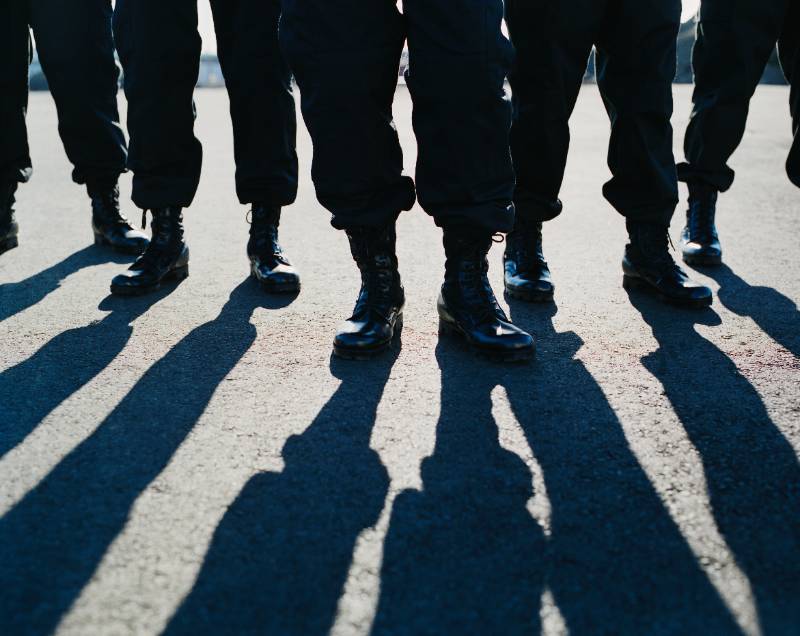Study Abroad

Enjoy Kaitlyn McMullin's 2025 first-place fiction peice from the Boar's Tusk 2024/2025 Journal. For more information about Boar's Tusk, click here.
********************************************************************************
There is an apartment in Russia, dingy from smokers who did not obey the “No Smoking” sign posted out front. The smell is the smell of 100 dinners and 100 families and 100 months of living. You have to take the stairs because the elevator is broken. If you take the stairs to the third floor and turn right and walk until you find number 23, you will find a woman. An old woman. A Babushka. She will be sitting at a tiny table that holds only one chair because no one visits anymore. The table sits in front of a fridge. The fridge is covered top to bottom, side to side with magnets—magnets of places she has never been, so many that the color of the fridge has now been forgotten. The fridge is a convenience that she can no longer live without, but was at one time a new and wonderful thing that blessed her life and made it easier. Name a fantastic place, and it is probably in the form of a magnet on that fridge. At one time she thought and really believed that she would visit all those places. But over the years, money, sacrifices, and a government that doesn’t care has slowly stolen the hope from her, and she knows now that she will never see any of those places, only their magnets. The magnets were gifts from more adventurous family members, meant as a kindness. “We were there and found this and thought of you to add to your collection.” They can never know the pain and the heartbreak of having this reminder of fantastic places boarded away by things beyond her control. Normally, the magnets sit forgotten. They are commonplace, blending in the background, hidden by their normalcy from the eyes that see them every day. But there are nights, such as this night, that her eyes become new and she notices the magnets, the sheer number to of them, all those places that will never be seen. Multiplying when people come over and see her unique collection, and think of her when they see another one and add to it. She feels the familiar feeling of loss, like she forgot something, forgot to take care of something, only to realize that something was Herself. She filled her life with responsibilities and sacrifices and forgot to leave room for her. She stands resolute. Reaching out the hands that have mostly worked and toiled for others. Hands that have helped her forget dreams and created wrong ones that never fit. Slowly, carefully, she throws them away.
There is a park in Norway where 10 children walk in one straight line, waddling like penguins in marshmallow snowsuits. The responsible adult in their lives has placed traffic cone orange vests over their suits, an alert to any who may come in contact. Notice these children, be cautious, slow down! They are little puppies outside to stretch legs and escape the exhaustion of constant indoor light. They are not yet trusted to be cautious themselves, hence the vests and the line. There is a stern woman leading the line, wearing a purple parka chosen for function, not fashion. She leads the children through the park, loving the order and routine of the after nap walk. One child purposely placed in the middle of the line to influence his behavior for good by his more obedient peers, steps out of line. He is the only child who routinely complains about his vest and tries to rip it off when it is placed around his round tummy. He has noticed an ice rink. The sun of the day has melted the top, and it is now shiny and slightly wet. He is now out of the line, and being passed without seeming to notice or care when abruptly he takes off in a run. Running toward this new found adventure, wet ice. He is a running flash of marshmallow and orange. For one glorious moment, he has broken away from the line and the vests and the caution, the glittering melty freeze too big a temptation. He runs under a rope with a sign that clearly says CLOSED. His feet clumsy, but well versed in clandestine runs, gaining speed so he can catapult himself onto the ice. Sliding on his tummy, thankful for the slick fabric of his dreaded vest helping him go faster, just like the true penguin his walk had been patterned after. The other children’s small mouths hang open in wonder. They too had seen the glittering ice, and one or two had the same idea cross their tiny penguin brains. But the purple coat leader, who was warm and wonderful and kind, was not those things to children who stepped out of line. So, most of the children in the interest of warmth and wonder chose to obey. But not the boy. He makes his forbidden discovery his now fantastic reality, slipping and sliding like he has done this all his life. The purple coated teacher has of course prepared for something like this. They are children after all. She speaks one or two words crisply and authoritatively, and the entire line lowers cushioned bottoms to the snowy ground to wait and watch the aftermath of their disobedient classmate. She expertly slides toward the boy, teacher turned ice skater, hoists the boy up by his vest—now useful for another reason—and marches him firmly back to his line of order and safety. She kneels down and speaks to him sternly in words only understood if you have happened to be scolded in Norwegian. All the skin that you can see through his snowsuit is pink from his adventure. He solemnly accepts his scolding and carefully steps back into his spot in line. They continued on, still cautious, still orderly, but changed, as they realized only one of them had the bravery for real fun on this day.
There is a kiosk in Sweden, it stands on a clean, cobblestone square. Delighting tourists with its bright red umbrella and authentic Swedish art. Inside the kiosk, a man stands, slightlytilting to the left ever since the injury that hurt him so deeply changed his life. He wears a red and black checked shirt and a beanie, left loose so the hair he still has peeks out and gives the illusion the bald spot on top does not exist. The kiosk sells “Swedish Meatballs” which annoys him because every meatball in Sweden is Swedish, and he cannot stand the redundancy. When tourists ask if he sells “Swedish Meatballs” he cringes and says, “Just meatballs.” In retaliation to the stupidity, he pretends to know less English than he does and gets a mean pleasure out of watching adults forced to play a game of communication charades for overpriced meatballs in gravy. The men talk slower and louder, as if slow and loud are the only two components of understanding language. The women try to mime cupping their hands and clasping them together over and over, like they are making invisible snowballs. If someone had told him that at age 42, he would be selling meatballs in a kiosk, he would have laughed until he cried. Now he just cries. The laughter left with the injury that took his career. Selling meatballs to idiots. A bright face appears at his window, “2 orders of Swedish meatballs please!” She holds out enough kroner for 50 meatballs, not understanding the value of the money in her hand, and trusting he will give her the correct change. He doesn’t, never does with customers like her. The wind catches her hair, flying it around her face in a crazy but beautiful way. Her eyes are bright in awe of all the new she sees around her, inadvertently hurting him with a life that he could never fathom now. One only for a young person excitement over everything, worry over nothing.
“Nepp!” He experiments which translates as “No!” in Swedish.
“Thanks so much!” She gushes her smile overtaking her face and shining in on him almost aggressively. Incorrectly translating his Swedish “Nepp” to her English “yep!” He glares at her and says in perfect English “Just. Meatballs. Everything in Sweden in Swedish. Go wait on that Swedish bench.” Startled at his unprovoked antagonism the girl turns away swishing her “anti-theft” bag all Americans order off Amazon. She quickly finds something new to be fascinated by, probably those damn cobblestones he grumbles to himself as he starts to fill the paper tray with meat and gravy. “Just. Meatballs.” He says out loud.
There is a rocking chair in America. Where a mother sits rocking her baby. A mother who before the baby thought naively that if she traveled in college her life would end up being more adventures than this rocking chair on the top floor of an apartment she can barely afford. But as she looks down, she is struck again by the magic of a sleeping baby. Its steady breath calms the spike in her nervous system when she imagines a more adventurous life. She strokes the perfect rosebud lips that make a tiny whistle of a sound as it sleeps, a baby snore if there ever was one. Looks at the precious, delicious cheeks, precise dark eyelashes, and is reminded all over again that the importance of life, her life, is already right here asleep in her chair. For a year of her life, she traveled. She saw miraculous things, in person! She traveled to the colorful, ice cream cone architecture of St. Basils Cathedral, danced in the light of the stained glass windows from Oslo City hall, spent an unforgettable night in an ice hotel in the Lapland’s of Sweden and while those were all amazing, what she remembers best is the woman with the fridge filled with magnets, the naughty marshmallow penguin boy, and the angry man who tilted slightly to the left. In the end no matter where you go it’s the ordinary that is extraordinary. She grabs onto the tiny hand that loves her best, leans back into the chair’s cushion, and smiles.


